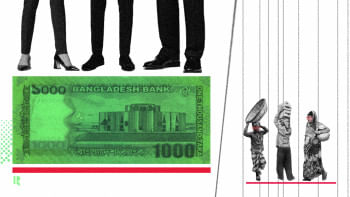What causes poverty to rise with ‘prosperity’?

After more than 40 years of relative calm since the end of the Second World War, the world is again slipping towards disorder and conflict. But beyond the conflicts arising from the desire to dominate resources, the Covid pandemic and the worsening climate crisis are also leading to the loss of livelihoods of millions of people, particularly in the developing world.
A great majority of the world population today is not in control of their fate. Their fates are being written by the rich, the powerful, and the big corporations who are controlling global resources, finances, and the arms industry. While there is global awareness of the increasing conflicts and disorder, what is not widely known is the scale at which deprivation and skewed development are threatening the lives and livelihoods of a large segment of people.
During the first three years of the pandemic, the global economy slumped; country after country saw their growth rates lowered and had to lay off workers. This has led to the lowering of incomes and an overall increase in poverty. Beyond the deaths and the loss of livelihoods, Covid-19 widened inequalities globally.
One element is the inadequate measures taken to stop rising prices, with central banks reducing the flow of money into their respective economies by increasing interest rates and withdrawing excess liquidity. While this may have curbed inflation, it also led to a squeeze around big companies to lay off workers, thus leading to a rise in unemployment.
A year into the pandemic, capital markets rose by $14 trillion. According to an analysis of the stock performance of 5,000 companies by McKinsey, 25 companies (mostly in the technology, electric vehicles, and semiconductors sector) accounted for 40 percent of the total gains.
Nabil Ahmed of Oxfam America noted that the "pandemic period has seen the biggest surge in billionaire wealth since the records began." According to Oxfam's "Profiting from pain" report, billionaires saw their fortunes surge as much in 24 months as they did in the last 23 years.
Bloomberg Billionaires Index noted that, during the pandemic, 131 billionaires more than doubled their net worth. Most notable among them are Louis Vuitton chief Bernard Arnault (whose wealth increased by $60 billion between 2000 and 2022), Elon Musk (who gained nearly $90 billion over the same period), and Gautam Adani (who saw his wealth also surge by $90 billion during the pandemic). Meanwhile, skyrocketing inflation reduced growth in real wages and ate into the disposable incomes of people globally. So, the question arises: what really caused this incredible widening of inequalities?
One element is the inadequate measures taken to stop rising prices, with central banks reducing the flow of money into their respective economies by increasing interest rates and withdrawing excess liquidity. While this may have curbed inflation, it also led to a squeeze around big companies to lay off workers, thus leading to a rise in unemployment.
Then, to boost economies, countries adopted policies such as tax breaks and financial incentives for businesses. Central banks flooded their economies with money to make lending and spending easier. Major central banks of the world infused more than $11 trillion into the global economy between 2020 and 2022. All these helped the rich become richer through financial market investments.
But instead of leading to more economic output, the money has largely been used in the speculative market. It was noted by Francisco Ferreira, director of the International Inequalities Institute at the London School of Economics (LSE), that this sudden infusion "led to a dramatic rise in asset prices, including stocks." This, too, has largely benefitted the rich.
This reality of money finding its way to the rich is not surprising to those who have studied the theory of market behaviour during periods of uncertainty caused by war and conflict.
At present, we are again faced with uncertainty caused by the war in Ukraine, the one in Palestine, as well as the 30 or so conflicts happening in various parts of Africa (some of which may well explode into larger conflicts).
The sad part is that while the rich may have enough resources to sail over such cycles, it will be the poor who will bear the brunt of rising prices and scarcities ensuing from the hostile market trends, unless they are engaged in the most primitive source of livelihood—that is, agriculture—which will keep them employed and provide for their basic needs.
Dr Atiqur Rahman is an economist, former adjunct professor at John Cabot University, visiting professor at the University of California, Riverside, and former lead strategist at International Fund for Agricultural Development (IFAD) in Rome, Italy.
Views expressed in this article are the author's own.
Follow The Daily Star Opinion on Facebook for the latest opinions, commentaries and analyses by experts and professionals. To contribute your article or letter to The Daily Star Opinion, see our guidelines for submission.

 For all latest news, follow The Daily Star's Google News channel.
For all latest news, follow The Daily Star's Google News channel. 











Comments